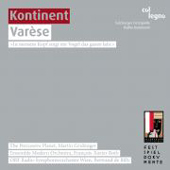
ESSENTIAL RECORDINGS

Live recordings from the 2009 Salzburg Festival "Kontinent Varèse".
1- Ionisation for percussion ensemble of 13 players (1929-31)
2- Offrandes for soprano and chamber orchestra (1921)
3- Hyperprism for 9 winds and percussionists (1922-23)
4- Intégrales for 11 winds and 8 percussionists (1924-25)
5- Ecuatorial for bass voice, 8 brass, piano, organ, 2 ondes Martenot and 6 percussionists (1932-34)
6- Amériques for large orchestra and percussionists (1918-21/1927)
7- Ionisation for percussion ensemble of 13 players (1929-31)
Oddly enough, Edgard Varèse (1883-1965), a French composer who forged his own way and created a
completely innovative musical language and unique compositional style, studied composition under Vincent d'Indy and
Charles Widor, two composers aesthetically far removed from his own "concrete" style. After a brief stint in Berlin, where
he rubbed shoulders with Richard Strauss, Varèse moved to New York city in 1915. By then, all his early works had been
destroyed in a fire. His most ambitious work, Amériques, and in my opinion his most
impressive, could therefore be considered to be his first opus.
Varèse was a pioneer of electronic music and stage works for percussion ensembles, and Amériques
is very much a piece for percussion instruments wrapped inside a large orchestral coccoon, which evolves to become a
multi-colored butterfly in the end. Heavily influenced by Stravinsky (he did attend the premiere of The Rite of Spring), it
also includes fragments from Debussy, Schoenberg and Strauss. If this piece is any indication of the impression New
York city left on the newly landed European, than what a profoundly visceral impression it must have been. I know the
impact it had on me as a kid, listening to a recording by the Utah Symphony Orchestra under Maurice Abravanel, has
always stayed with me and led me to believe that this was one of the most influential works of the 20th century. Composers
like John Cage, Harry Partch, Olivier Messiaen, Stockhausen, Xenakis and even Frank Zappa were all, in their own distinct
ways, by-products of that influence.
Although the external appearance of Amériques may, at first glance, seem cacophonous,
there is a method to its madness. Two main motifs actually serve as signposts throughout the whole work's duration,
a work that captures the hustle and bustle, the noise, the nervous tension, the alienation of a large city's atmosphere,
complete with various percussion instruments including a siren and the ondes Martenot. It evokes the violent nature,
the dark under-belly, the almost savage and intimidating arrogance of the city. To the point where, at the end, it
sounds like the full orchestra is trying to overcome the noise by pounding the daylights out of it, until the final
overwhelming tutti, including the siren, makes you want to recoil in fear.
Add to this the nervous energy of a 'live' performance marked by the kind of precision that you can only achieve through
instinctive communication between the players, combined with an emotional abandon, and the final result is one of
the best recordings I've heard of this piece in a long time. And that goes for each and every piece on this CD, but
I've used up too much ink already on this review to go into any more details. The Col Legno label
has done us all a favour by grouping all these 'live' performances together. A collection that should serve as a great
introduction to the composer's output for those who have yet to experience it, and at the same time deserves a place
of honor on any collector's shelf.
"I am not a musician. I work with rhythms, frequencies and intensities. Tunes are the gossips in music." {Edgard Varèse}
Jean-Yves Duperron - September 2011